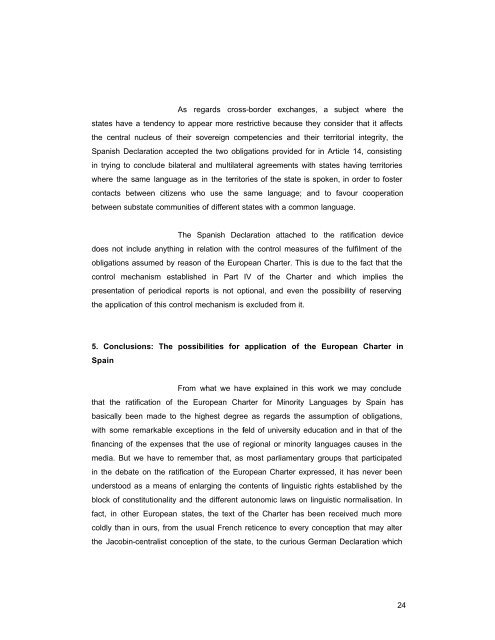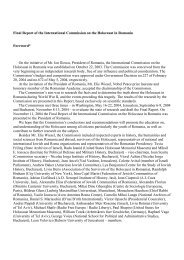get PDF document - MIRIS
get PDF document - MIRIS
get PDF document - MIRIS
You also want an ePaper? Increase the reach of your titles
YUMPU automatically turns print PDFs into web optimized ePapers that Google loves.
As regards cross-border exchanges, a subject where the<br />
states have a tendency to appear more restrictive because they consider that it affects<br />
the central nucleus of their sovereign competencies and their territorial integrity, the<br />
Spanish Declaration accepted the two obligations provided for in Article 14, consisting<br />
in trying to conclude bilateral and multilateral agreements with states having territories<br />
where the same language as in the territories of the state is spoken, in order to foster<br />
contacts between citizens who use the same language; and to favour cooperation<br />
between substate communities of different states with a common language.<br />
The Spanish Declaration attached to the ratification device<br />
does not include anything in relation with the control measures of the fulfilment of the<br />
obligations assumed by reason of the European Charter. This is due to the fact that the<br />
control mechanism established in Part IV of the Charter and which implies the<br />
presentation of periodical reports is not optional, and even the possibility of reserving<br />
the application of this control mechanism is excluded from it.<br />
5. Conclusions: The possibilities for application of the European Charter in<br />
Spain<br />
From what we have explained in this work we may conclude<br />
that the ratification of the European Charter for Minority Languages by Spain has<br />
basically been made to the highest degree as regards the assumption of obligations,<br />
with some remarkable exceptions in the field of university education and in that of the<br />
financing of the expenses that the use of regional or minority languages causes in the<br />
media. But we have to remember that, as most parliamentary groups that participated<br />
in the debate on the ratification of the European Charter expressed, it has never been<br />
understood as a means of enlarging the contents of linguistic rights established by the<br />
block of constitutionality and the different autonomic laws on linguistic normalisation. In<br />
fact, in other European states, the text of the Charter has been received much more<br />
coldly than in ours, from the usual French reticence to every conception that may alter<br />
the Jacobin-centralist conception of the state, to the curious German Declaration which<br />
24












